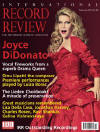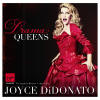Texte paru dans: / Appeared in:
*

International Record Review - (02/2013)
Pour
s'abonner / Subscription information
Virgin
6026542

5099960265425 (ID260)

Drama queens: I should think that most of us have come across one or two of those but none who can sing as superbly as Joyce DiDonato. Simon Heighes, in a helpful note tinged with humour, writes of operatic queens actually portrayed onstage, of beings who in the range of works covered in this CD ‘found themselves emotionally exploited — deceived, rejected and taunted by love’ . Of those sung by DiDonato on this well-filled disc, Handel’s Alcina and Cleopatra are known entities, and such artists as Dino Borgioli, Janet Baker, Cecilia Bartoli and David Daniels have recorded the aria from Cesti’s Orontea, but Porta’s Ifigenia and Orlandini’s Berenice have been resting in the seclusion of rarely opened scores. The two items by Keiser have not frequented LP turntables or CD players, although long ago the English bass Scott Joynt recorded an aria from Octavia in HMV’s ‘History of Music in Sound’.
The earliest extract is Ottavia’s monologue from Monteverdi’s L’incoronazione di Poppea, to which SH aptly refers as a ‘propulsive, rhetorical recitative that stubbornly resists almost every attempt to break into a melody’. It does, however, draw from DiDonato a first-rate piece of descriptive singing as Ottavia expresses her changing emotions, from resignation at her desertion by Nero to her imprecation to Jove to punish her erring husband with thunderbolts. The poor woman appears in Keiser’s Octavia too, here singing again of her suspicion about Nero’s infidelity. Keiser provides a fascinating accompaniment of five bassoons and a harpsichord continuo, above which DiDonato draws on a fuller sound in accordance with the text, adding gently rippling little figurations in the da capo. In a second Keiser opera, Fredegunda, Galsuinde faces a similar situation by contemplating her death. In the slow-moving ‘Lasciami piangere’ , DiDonato’s timbre is at its most beautiful, her phrasing eloquent, the trills not distracting the smooth flow of the musical line , and Keiser’s writing for the woodwind is graceful.
Another queen faced with an unfaithful spouse is Irene, whose aria ‘Sposa, son disprezzata’ is by Geminiano Giacomelli (c. 1692-1740) but later, SH tells us, was used by Vivaldi in his Bajazet, with different words from those sung here. Predominantly slow, it enables DiDonato to lay before us long lines of steady tone, decorated in the da capo by an occasional shake.
Possibly the most famous of DiDonato’s queens is Cleopatra, the most well-known aria on the disc being her ‘Piangerò la sorte mia from Handel’s Giulio Cesare. DiDonato performs it (lives it, even) with skill, her luscious tone rich in the first section, becoming vibrantly dramatic in the middle lines’ brief display of coloratura and sweetened in the final part, to all of which she adds delectable variations. In 1725, the year after Handel’s opera received its premiere, Hasse’s Cleopatra made her bow in Antonio e Cleopatra. To show that not every aria in this recital is on the slow side, this Egyptian queen dispatches ‘Morte col fiero aspetto’ in virtuosic divisions, and just as death holds no horror for her, so the music holds no terrors for DiDonato ( or so it seems).
1725 saw the first outing for Berenice by Giuseppe Maria Orlandini (1676-1760) too, from which two arias have been selected, one of which, ‘Da torbida procella’, opens the delights with another display of vocal agility brilliantly accomplished by DiDonato. That aria contains joyful coloratura, but in ‘Col versar, barbaro’ Berenice, on being told by the Roman emperor Titus that he cannot marry her, flares into threatening action by telling him that she will therefore kill herself. The virtuosity needed to triumph over the swift scalework is coruscatingly supplied by DiDonato. Here and elsewhere, Alan Curtis’s Complesso Barocco’s partnership is invaluable. It is composed of 26 players.
If Berenice threatens suicide, Ifigenia, in Giovanni Porta’s 1738 opera, has been told by Agamemnon, her father, to sacrifice her life for the people. No vocal fireworks are needed in this aria, sung with much sensitivity, as is Orontea’s ‘Intorno all’ idol mio’, a love song in which she asks the gentle zephyrs to hover around her beloved Alidoro. Also happy is Rossane in Alessandro, expressing ‘sweet contentment’ in lengthy manifestations of joyful fioritura, in which DiDonato is at her thrilling best. The remaining Handel aria, Alcina’s ‘Ma quando tomerai’, also places demands on a singer’s fond technique, and DiDonato deals with them splendidly while employing a bigger tone than as Rossane and contrasting that with the softer middle section. The recital concludes with the last of these arias to be composed: Armida’s ‘Odio, furor, dispetto’. The preceding recitative builds to this exhibition of rage, for which DiDonato hardens her tone with a bite to emphasize Armida’s anger.
This is a treasure of a disc, for the music, the
orchestra and Joyce DiDonato. Note to Virgin Classics: many more queens
inhabit Baroque opera.
Fermer la fenêtre/Close window
Cliquez l'un ou l'autre
bouton pour découvrir bien d'autres critiques de CD
Click either button for many other reviews


